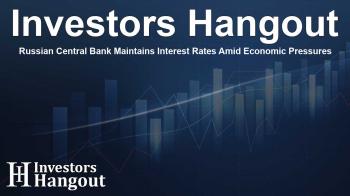Russian Central Bank Maintains Interest Rates Amid Economic Pressures

Interest Rate Decisions Amid Economic Challenges
The Russian central bank has decided to keep its key interest rate at 21%, a choice that has left many market analysts surprised. Expectations were set for a 2 percentage point increase due to ongoing inflation worries, which the bank's latest decision contradicts.
Putin's Influence and Economic Context
On the previous day, President Vladimir Putin made a significant public appeal during a nationwide phone-in. He urged the central bank to take a 'balanced' approach, in light of the economic pressures stemming from the protracted conflict in Ukraine, which has notably influenced inflation and economic activity.
Concerns from Business Leaders
Business leaders across the nation expressed their concerns regarding high-interest rates, claiming they hinder investment opportunities. Despite this, a majority of economists polled still predicted an increase to 23%. According to a statement from the central bank, the tightening of monetary conditions has already set the groundwork for potential disinflation.
Inflation Rates and Economic Indicators
Currently, the inflation rate stands at 9.5%, significantly above the desired 4% target. The bank noted that although lending has slowed and domestic demand weakened, this tight monetary policy may pave the way for restoring inflation to its target levels.
Predictions and Future Assessments
As outlined by the central bank, future interest rate assessments will be conducted during their next scheduled meeting on February 14. Despite the legal framework guaranteeing the independence of the central bank, the influence of powerful business leaders became increasingly apparent, contributing to the decision to hold rates steady.
Business Pressure and Economic Outlook
Established figures in the business sector have voiced their frustrations with the current policies. Economic leaders, including the heads of major oil and defense companies, indicated that heightened interest rates are causing them to rein in investment activities. According to one anonymous executive, the current return rates on projects fall below acceptable levels, necessitating cutbacks in planned investments.
Economic Conditions and External Pressures
The economic landscape in Russia faces complexities fueled by military expenditures and widening inflation. Concurrently, the economy is showing signs of constrained growth, with predictions placing it at 4% for the year 2024. The ongoing conflict has exacerbated vulnerabilities, including the downturn of the rouble against the dollar, highlighting the economic challenges at hand.
Putin's Response to Economic Challenges
In light of rising food prices and an emphasis on maintaining stability, President Putin attributed inflationary pressures to Western sanctions and agricultural difficulties, which have impacted the purchasing power of the Russian populace. Staple food items, including dairy products and vegetables, have seen prices surge, further intensifying public concern.
Conclusion: Navigating the Financial Landscape
The landscape of Russian finance continues to evolve, with the central bank navigating the intricate balance between controlling inflation and supporting economic growth amid external pressures. As they prepare for future evaluations, both domestic influences and global dynamics will play a crucial role in shaping the financial policies of Russia in the months to come.
Frequently Asked Questions
What prompted the Russian central bank to maintain the interest rate?
The decision to keep the interest rate at 21% was influenced by the current economic conditions and inflationary pressures, alongside President Putin's public request for a balanced approach.
How does the current inflation rate compare to the central bank's target?
The current inflation rate is 9.5%, which is significantly above the central bank's target of 4%, highlighting ongoing economic challenges.
What are the expectations for future interest rate changes?
The central bank has indicated that it will reassess the need for any interest rate hikes at its upcoming meeting in February.
How are high-interest rates impacting businesses in Russia?
High-interest rates are affecting businesses by limiting their ability to invest, as returns on projects fail to meet acceptable thresholds.
What external factors are influencing Russia's economy?
Western sanctions, military spending, and fluctuations in the rouble's value are significant external factors contributing to the current economic situation in Russia.
About Investors Hangout
Investors Hangout is a leading online stock forum for financial discussion and learning, offering a wide range of free tools and resources. It draws in traders of all levels, who exchange market knowledge, investigate trading tactics, and keep an eye on industry developments in real time. Featuring financial articles, stock message boards, quotes, charts, company profiles, and live news updates. Through cooperative learning and a wealth of informational resources, it helps users from novices creating their first portfolios to experts honing their techniques. Join Investors Hangout today: https://investorshangout.com/
Disclaimer: The content of this article is solely for general informational purposes only; it does not represent legal, financial, or investment advice. Investors Hangout does not offer financial advice; the author is not a licensed financial advisor. Consult a qualified advisor before making any financial or investment decisions based on this article. The author's interpretation of publicly available data shapes the opinions presented here; as a result, they should not be taken as advice to purchase, sell, or hold any securities mentioned or any other investments. The author does not guarantee the accuracy, completeness, or timeliness of any material, providing it "as is." Information and market conditions may change; past performance is not indicative of future outcomes. If any of the material offered here is inaccurate, please contact us for corrections.
